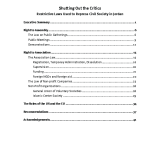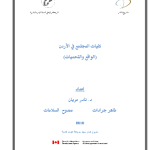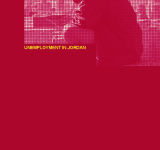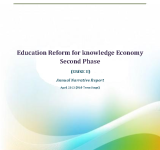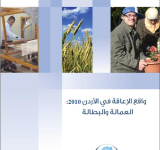طالب
يتطرق هذا التقرير إلى أوضاع كليات المجتمع في الاردن الواقع والتحديات. حيث يعرض جملة من المؤشرات حول الملتحقين بهذه الكليات وخريجيها;; وذلك استناداً على أحدث اليبانات المتوفرة. ويتعرض لوضع الهيئتين الإدارية والأكاديمية العاملتين في تلك الكليات. وكما يركز في عملية التحليل على حجم مساهمة حملة دبلوم كليات المجتمع في سوق العمل الأردني. إضافة إلى ذلك يقدم التقرير قراءة تحليلية للأوضاع الحالية لكليات المجتمع ووضع تصور حول الآفاق المستقبلية لتلك الكليات لمواجهة التحديات.
This pilot study report was initiated by the European Training Foundation (ETF);; in close cooperation with the National Center for Human Resources Development (NCHRD) in Jordan;; in the framework of the ETF multiannual project Observatory Function Development in Jordan. The focus of this report is unemployment. However;; considering that unemployment information in itself should not be used or analysed in isolation from other indicators or data;; the report begins by providing an overview of the general labour market situation in Jordan. After the main data on employment by sector;; age;; gender and level of education are presented;; on the basis of the available information;; the specific cases of non-Jordanian employees and employment in the informal economy are highlighted as topics requiring special attention in the Jordanian labour market. In conclusion;; two groups of recommendations are proposed: (i) technical recommendations to main information providers for improving the quality of the information collected;; and (ii) a set of policy recommendations for tackling unemployment. These recommendations are intended to support policymakers in their commitment and willingness to adapt both the formal and informal education and training system and the whole labour market in Jordan.
The second phase of the Program Education Reform for the Knowledge Economy Program (ERfKE II) continues to build on the achievements of the first phase and follow the same implementation arrangements that have proven to be successful in (ERfKE I);; and in the same time;; focuses on schools as the locus of change as well as on the need to enhance capacity building at the central and field levels. The development objective of (ERfKE II) is to provide students enrolled in pre-tertiary education institutions in Jordan with increased levels of skills to participate in knowledge economy. Also the Mid-Term review highlighted the concrete progress achieved by (ERfKE II) in several key areas related to policy development;; quality of education interventions and school construction;; and identified the key issues as a summary of the overall progress that will be tackled and addressed during the remaining stage of implementation.
تقرير تحليلي للنتائج الرئيسية لمسح الإعاقة في الأردن;; الذي نفذته الدائرة خلال شهر تشرين الثاني 2010 بدعم من المجلس الأعلى لشؤون الأشخاص المعوقين. وغطى المسح عينة من الأسر بلغ حجمها حوالي (13) ألف أسرة بصورة تضمن التمثيل على مستوى المملكة والحضر والريف والأقاليم الثلاثة والمحافظات. واستندت هذه العينة إلى الإطار الذي وفرته نتائج التعداد العام للسكان والمساكن لعام 2004. ويهدف هذا التقرير بشكل رئيسي إلى إعطاء صورة عن مدى انتشار الإعاقة في الأردن;; والإعاقات الأكثر انتشاراً بين أفراد المجتمع الأردني;; ويتضمن التقرير منهجية المسح وأسلوب جمع البيانات والنتائج التحليلية.
